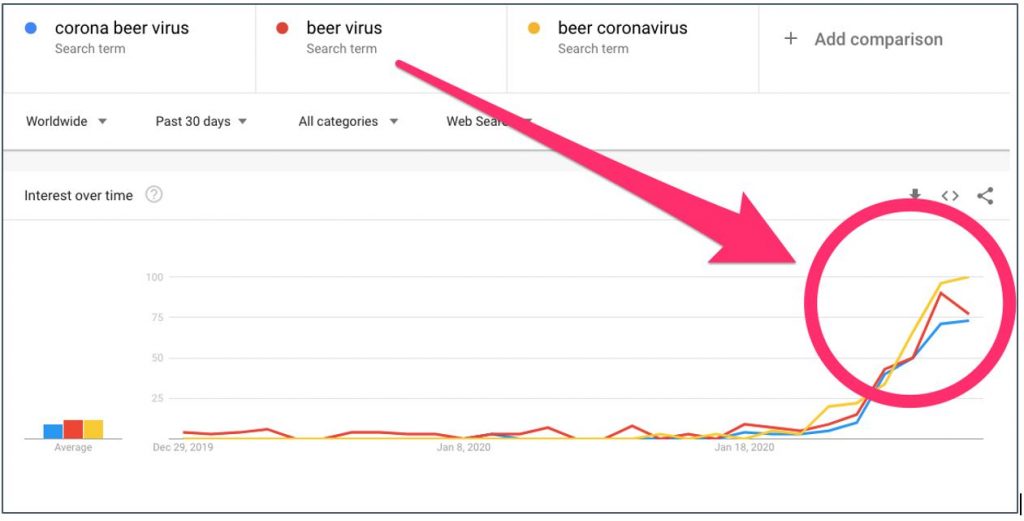# notthatCorona
In 2019 I wrote a blog titled #notthatPaladin in response to the connection that had been made between my company and the Paladin involved in the provision of detention services on Manus Island.
I thought I had it bad but spare a thought for poor old Corona beer.
As reported in Business Insider Australia, the recent Corona Virus has resulted in a significant spike in internet searches for terms such as: “corona beer virus,” “beer virus,” and “beer coronavirus” since January 18 2020, as highlighted in the graph below:

Not only did internet searches increase, the inevitable memes began to surface on social media:



Of course, there is no connection between the beer and the virus. The name coronavirus comes from the fact that under a microscope the virus has crown-like spikes protruding from it.
“Corona” in Latin means crown, and the word is the same in Spanish. Corona beer originated in Mexico. In English, the anatomical term “corona” is used for body parts resembling a crown.
So, has the association affected, or is it going to affect, the company in the future?
The Financial Post highlighted similar correlations in the past that were devastating for companies:
“The marketing campaign for Ayds, an appetite suppressing candy, was simple but effective enough to make it a household name in the U.S. during the 1970s. The pitch was that consumers could lose weight while still eating chocolate mint and butterscotch-flavoured sweets.
It was a hit — at least until the AIDS epidemic swept through the U.S. in the 1980s. Even a name change to “Diet Ayds” couldn’t rescue the product.
Massachusetts-based Isis Pharmaceuticals found itself in a similar position five years ago as the terrorist group of the same name rose to global infamy. The drug company, too, chose to change its name — to the less-charged Ionic Pharmaceuticals”.
As I write this blog on the 7th February, the stock price for Corona’s parent company, Constellation Brands has risen nearly 10%, so whilst the internet searches have increased significantly, and there is a potential for damage, at this stage there appears to be no impact on the brand.
So, what, if anything, should Constellation Brands do at this point to manage the risk?
This is one of those few times where I believe that reacting might do more damage than remaining silent, a position also supported by Jane Shapiro, senior vice president of corporate and crisis communication at Hill + Knowlton Strategies.
“If I were them at this point, I think doing nothing is right,” Shapiro said. “You do nothing visibly but monitor really actively behind the scenes … for misinformation and any stronger correlation between their brand and the disease.”
Shapiro, like the company, does not think that anyone truthfully believes the beer is actually spreading the virus and so “it doesn’t require them to do anything.” That can change, she said, depending on if the jokes evolve into a conspiracy theory and if accounts with tens of thousands of followers are sharing them.
Sometimes the best way to treat a risk is to do nothing different. The company has done nothing wrong and there is (or shouldn’t be) anyone on the planet that believes drinking Corona leads to contracting the virus.
Sometimes a crisis is only a perceived crisis, and, in this case, I do not believe that company is facing a crisis – particularly given the increase in the share price. So, if the increase in internet searches and the constant memes have not hurt them, I wonder what would have been the impact had the memes been like this:

